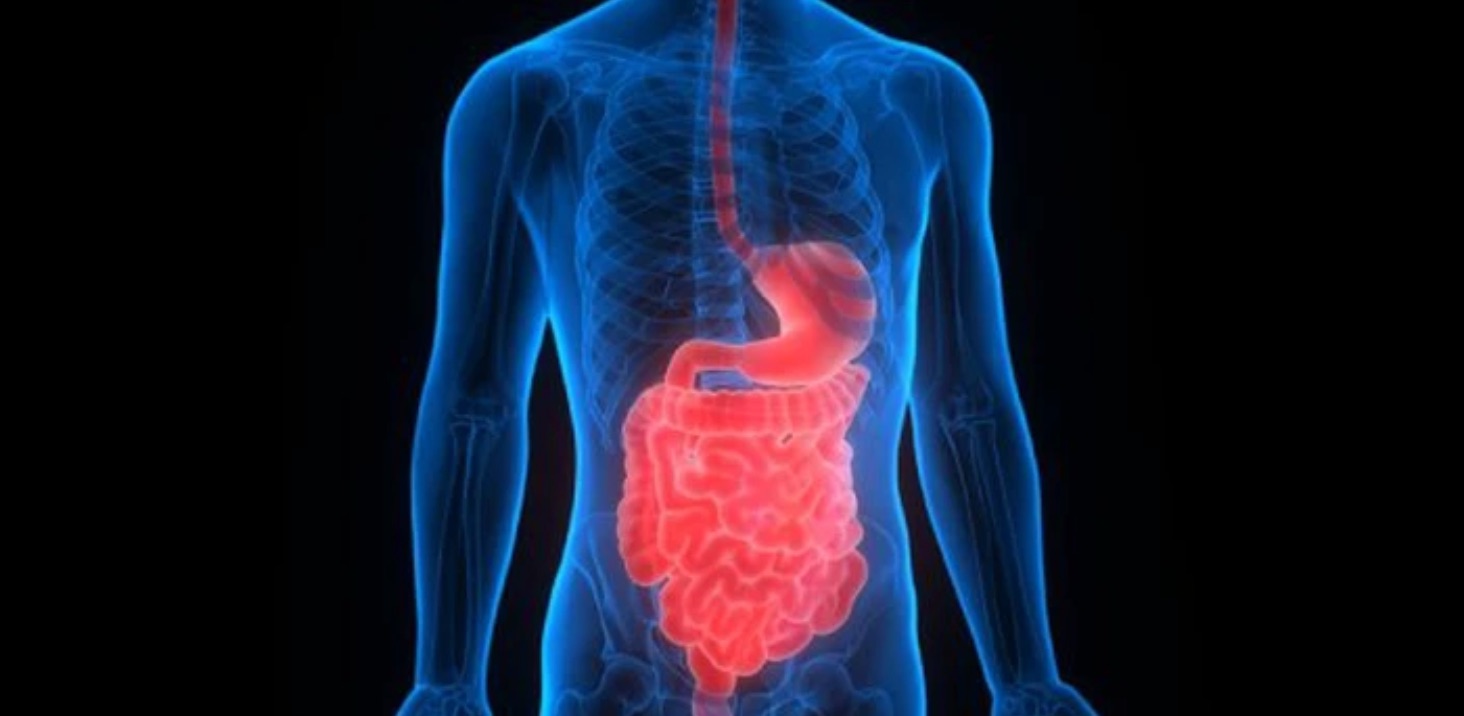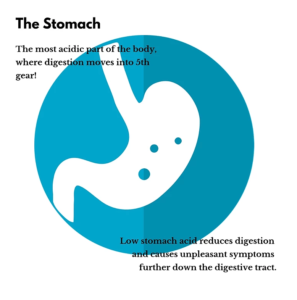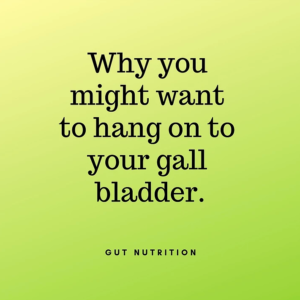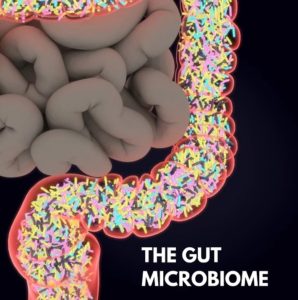
Firstly, what is the GUT?! The gut, gastrointestinal tract, alimentary canal or digestive tract as it is also know is a passage in which food passes through starting at the mouth and ending at the anus.
I am going to take you on a journey through this incredible digestive system, are you sitting comfortably?
Digestion starts in the mouth
Chewing your food breaks it down into smaller more digestible pieces and mixes it with enzymes which further digest the carbohydrates and starches. It is therefore important to chew your food properly to maximise the digestion taking place at this stage.
Eating on the hoof isn’t going to be good for your digestion.
Try and focus on mindful eating by taking time to chew your food properly and focusing on each mouthful.
Mindful eating not only aids digestion reducing digestive problems further down the digestive tract but also means that you will actually taste and enjoy your food more and most probably eat less!
The importance of optimal stomach acid
 Once your food has been chewed up in the mouth it passes down the oesophagus via muscular contractions known as peristalsis.
Once your food has been chewed up in the mouth it passes down the oesophagus via muscular contractions known as peristalsis.
From the oesophagus food moves into the stomach where digestion moves into 5th gear!
The sheer smell, sight and taste of food stimulates digestive juices and increases acidity in the stomach preparing it for optimal digestion. That is why it is so important to practice mindful eating rather than scoffing a sandwich on the hoof!
The stomach is the most acidic part of the body, it should be between pH 1.5 – 3.5.
It needs to be really acidic for several reasons including:
- To kill off any foreign bad bacteria the body comes in to contact with.
- To stimulate digestive enzymes for digestion of proteins.
- To stimulate intrinsic factor which is necessary for vitamin B12 absorption, a lack of which can cause fatigue, shortness of breath, mouth ulcers and low mood to name a few.
- Stimulation of bile release further down the tract, a lack of which can cause gall stones which can be debilitatingly painful and end in surgery if not corrected soon enough.
As a nutritional therapist specialising in gut health, helping many people with chronic digestive problems, low stomach acid, or hypochloryida if you want it’s technical name, is one of the most common underlying causes that I have to address to rid the client of their symptoms.
Causes of low stomach acid include:
- over use of antibiotics
- Helicobacter Pylori infection
- painkiller use e.g NSAID’s (anti-inflammatory meds such as ibuprofen)
- poor diet
- chronic stress
- eating too quickly or on the go
- antacid medication such as omeprazole or lansaprazole (dreadful things – only necessary if you have an ulcer)
If your stomach acid isn’t strong enough then the rest of your digestive system suffers in more ways than one:
- You don’t stimulate bile release from your gall bladder which reduces absorption of fat soluble vitamins and can result in gall stones – very painful!
- Acid reflux or heartburn
- Bloating
- Wind
- Food sensitivities
- Leaky gut
- Candida
The Small Intestine
The small intestine is made up of 3 segments – the duodenum, jejunum and ileum. It is where further digestion and the majority of your absorption of nutrients takes place.
Digestive enzymes are secreted into the small intestine from the pancreas and gall bladder to break down the food.
The first part of the small intestine, the duodenum is where digestion happens, it is very important that the food (or chyme as it is now known) that passes into the small intestine is very acidic as this stimulates the release of bile from the gall bladder and digestive enzymes from the pancreas.
The Gall Bladder
 I’ve mentioned a few times already the importance of stomach acid in stimulating bile release from the gall bladder. But why is it so important?
I’ve mentioned a few times already the importance of stomach acid in stimulating bile release from the gall bladder. But why is it so important?
The liver is continuously producing bile which is stored in the gall bladder to be released on stimulation from acidic chyme (food) passing from the stomach to the small intestine.
If bile is not stimulated, bile salts can form into stones causing pain and discomfort and sometimes resulting in gall bladder removal if chronic.
Bile is required to break down fats and absorb fat soluble vitamins. If you don’t have a gall bladder or you do not stimulate the secretion of bile then you may become deficient in fat soluble vitamins namely A, D, E and K.
If you experience pain after eating (particularly after a fatty meal), fatty or oily stools or stools that float, I strongly suggest seeking advice as it may be that your gall bladder is sluggish and needs stimulation. You do not want gall stones to form so large that you may need surgery as your gall bladder is plays a big role in the digestion and absorption and nutrients.
The Jejunum
The middle of the small intestine, called the jejunum, is where all the absorption of nutrients happens.
The lining of the small intestine is so thin to allow for maximum absorption, which is great as it means that the body can take in lots of nutrients instead of them passing through unused.
This thin layer, however, also means that it can become easily damaged by toxins and medication resulting in the delicate layer being penetrated and becoming ‘leaky’. A term we call ‘leaky gut’.
This can result in undigested food particles, toxins and bacteria entering the main circulatory system.
You may experience that you become more intolerant to certain foods as a result of a leaky gut. The problem is not the food itself but the gut lining that needs to be repaired.
When particles enter the blood that shouldn’t, an immune response is triggered within the body which causes a reaction – this may be itchy skin, bloating, abdominal pain, diarrhoea, brain fog or headaches for example.
The key is to heal the gut first and then the symptoms will disappear.
The jejunum, the midsection of the small intestine contains circular folds together with villi (finger like projections protruding the length) that serve to increase surface area of the jejunum enabling an increased absorption of nutrients. These villi are damaged in coeliac disease and SIBO.
The Ileum
The ileum, the last part of the small intestine, also contains villi for increased absorption and is the main site of B12 and iron absorption.
Any disruption in the absorption of nutrients can result in fatigue and possible anaemia due to low iron and B12 along with a deficiency in other vital vitamins and minerals.
If someone is presenting with bloating, lots of wind either end, constipation or diarrhoea and/or acid reflux it may be that they have an overgrowth of bacteria living in the small intestine (SIBO) or possible Candida.
Other symptoms that are seen with these conditions are brain fog, anxiety and achey joints.
Small intestinal bacteria overgrowth or Candida overgrowth can present in a person as these IBS symptoms and if you go to the doctor they will probably tell you that you have IBS and explain how to manage it with medication.
The truth is that what needs addressing is the state of the small intestine which can be done through testing to ascertain what is going on followed by a targeted tailored diet, lifestyle and supplementation plan.
The Appendix
The appendix, which sits off the cecum, acts as a reservoir or safe house for healthy bacteria, injecting the large intestine with a hefty dose if it comes under attack with unhealthy bacteria it needs to fight off.
Research has shown that those without an appendix are 4 times more likely to have a recurrence of Clostridium difficile which is a bacterial infection involving symptoms of diarrhoea, abdominal pain and nausea.
The infection can be resolved with natural anti-microbials though and then the gut has to be restored back to optimal health so that it can fight off anything it comes into contact with moving forward.
If you have had your appendix removed, I suggest working on improving your gut microbiome and I don’t just mean by taking a probiotic. Improving the environment that the gut bacteria live in by supporting strong structure and a cushioning mucous layer to protect the lining of the intestines in key.
The Large Intestine
 While every part of the digestive tract plays its own important role in the digestive process, the large intestine is particularly interesting as it contains lots of bacteria which further break down food that cannot be digested by your own body. This is because the human body does not contain the necessary enzymes to digest these foods.
While every part of the digestive tract plays its own important role in the digestive process, the large intestine is particularly interesting as it contains lots of bacteria which further break down food that cannot be digested by your own body. This is because the human body does not contain the necessary enzymes to digest these foods.
The foods I am referring to are called indigestible fibres which are present in vegetables.
On reaching the large intestine, these undigested fibres are broken down or fermented by your lovely gut bugs.
During this fermentation process your gut bugs produce by products that are beneficial to your body, namely B vitamins, vitamin K and anti-inflammatory compounds known as short chain fatty acids (SCFA’s).
The collective weight of all the bugs living in the human large intestine is a whopping 2kg!!
The gut microbiome or gut flora as it’s also known, is vital for breaking down food and toxins, making vitamins, suppressing inflammation and training the body’s immune system.
When the gut flora is out of whack, it is not only the gut that can suffer but the rest of the body too.
We live in harmony with our friendly gut bugs and it is really important to look after them so that they can do their job of looking after us.
Unfortunately, the average western diet and lifestyle doesn’t do our gut flora any favours. This is due to increased medication use, such as ant acids, pain killers and antibiotics, high sugar and low fibre diets, stress and lack of movement.
Making a few simple changes to your diet and lifestyle can hugely affect your gut flora and gut health and by extension your whole body and mind.
Antibiotics
Antibiotics have a place for sure as they save lives. However, they are not always the only answer and often not the answer at all.
They are extremely damaging for the gut flora as they wipe out the good bacteria with the bad.
They may not work at all in 20 years time when we all become resistant to them if they are continued to be over used and used when not needed. This will be devastating for those people that actually need the antibiotics. So instead of going to your doctor hoping for an antibiotic prescription just think if you actually need them – is there anything you can do naturally to sort your problem out.
I work with many natural antimicrobials which work well for many conditions where antibiotics would have been the alternative and also for those where antibiotics aren’t working.
If you have to take antibiotics then make sure to support your healthy bacteria by taking a quality probiotic that can withstand the stomach acid during and 1 month following your course.
To Summarise
Every single part of the digestive tract plays an important role in digestion and absorption and if one part is not working properly then repercussions can be experienced in the rest of the body too.
You may not link those repercussions to your digestive tract, you may think tiredness, cravings, itchy skin and weight gain are just life’s journey. Let me tell you that any digestive difficulties that you may have will unfortunately negatively impact your health.
A healthy, well functioning digestive tract is absolutely vital for your well being, health and happiness.
Just take a moment to think whether your digestive system could be improved, even slightly? If so do something about it now.
Don’t wait for it to ‘hopefully pass’ or think ‘it’s not bad enough to do anything about it’ as it will only get worse and will already be negatively impacting your health.
I see it time and time again with clients who come to see me after years of struggling wishing they had done something about it sooner.
Don’t make the same mistake that many other people do and wait until it gets so bad, meaning years of unnecessary suffering and more unpleasant symptoms.
Just click on the link here https://www.clientscentral.com/campaign/452/FreeHealthConsultation and select a taster session with me at absolutely no cost, to understand how you can improve your digestive system and by extension your health and happiness.
